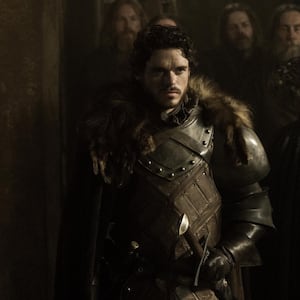There’s a scene in Bodyguard’s finale more striking than any in political-thriller memory.
It comes at the very end, after the absurdly gripping—and preposterously implausible—action sequences have wrapped up, and our hero, David Budd, has emerged victorious. He sits in a dim room, looking more boyish and vulnerable than we’ve yet seen. His head wounds have healed, his guns are gone, and his brow is furrowed in a moment of rare, unrestrained distress. Then comes the kicker: David breaks down in tears. Gazing at the counselor across from him—we can tell she’s a therapist due to her earth-tone sweater—he sputters, “I’m David. And I need some help.”
We’ve been primed for this moment throughout the six-episode series, but it still comes as a bit of a shock. Emotion isn’t a luxury afforded to most smashing (in more ways than one) male action stars, who are more likely to carry out their risky business with a near-robotic level of placidity, if not a beefy dose of perverse pleasure.
Richard Madden, best known for his turn as Game of Thrones’ venerable Robb Stark, is a fascinating fit for the role. He’s aces at toggling among David’s many modes: the clean-cut square, the furious avenger, the troubled depressive. But even as David shape-shifts, Madden never loses sight of the incurable loner at his core, ever-searching for meaning and purpose.
“What’s great about David Budd is taking what typically could be just played as this kind of hero situation and putting everyone into a grey zone,” Madden tells The Daily Beast. “No one’s the evil mustachio-twizzling villain, and there’s no way to just play that. Actually everyone, much like real life, is a bit of both.”
David, Madden believes, takes refuge in an idea of himself as “the knight in shining armor for every aspect of his life. And if he can protect this woman, or protect his wife, or protect his kids and keep them intact, then somehow he would be intact. And actually that’s not how it works.”
In the finale, we find David in a state of complete disarray. He’s angry at his superiors, distrustful of his supposed allies, and more stubbornly determined than ever to avenge his late boss, Home Secretary Julia Montague (Keeley Hawes), whose bed he also happened to share on several steamy occasions. His first stop is a rendezvous with the Home Secretary’s uppity ex-assistant, impeccably named Chanel. Deeply embedded in the white collar crime scene, Chanel uses their meeting as a setup, and David ends up getting dragged off by a group of thugs. When he awakens, bloodied and disoriented, he finds himself strapped inside a suicide bomber’s vest, his thumb taped to the detonator.
It’s hard to wrap your mind around the deranged logic of the sequence that follows, in which David, still bound to the bomb, clomps across London toward his flat as a horde of officers clears the way of pedestrians. His wife trots by his side, to ensure none of the encircling agents decide to just take him out.
“It was intense. And it was grueling. It wasn’t easy,” Madden says of the finale, which took nearly a month to shoot. “You’re isolated by the nature of the fact that you’ve got this bomb on you. So you’re literally by yourself all day, and the scenes I am talking to people I’m doing it through a radio,” he recalls.
Though the actual outfit required wasn’t that bad. “To be fair, the bomb was actually more comfortable than the bulletproof vest I wore for episodes 1, 2, and 3. That was real uncomfortable. I mean it corrected my posture brilliantly, but it was uncomfortable. And so putting the bomb vest on, I was like, this is fine, actually. I’m OK with this.”
During some tired mornings, Madden’s make-up artists would flip on the soundtrack from Kevin Costner and Whitney Houston’s 1992 film The Bodyguard—a movie unrelated to the show that Madden loves nonetheless—to get the actors up and going. “By that point of shooting, because we’re right at the end, I was on a coffee diet,” he says. “It was just about getting as much food and coffee in me as possible to keep you going and energized.”
When Bodyguard’s thrilling finale aired in the UK on September 23, 10 million people tuned in. Within a month, that number had doubled, making it the most-watched episode—and series—on record. Bodyguard’s explosive success wasn’t a Cinderella story, exactly; its creator, Jed Mercurio, was already known in his native UK for the gripping Line of Duty, among other equally twisty drama series. When Bodyguard came out, his fan base was already standing by to devour it whole.
But the other, obvious answer as to why the show took off is Madden. For the first half of the series, Madden plays David as a handsome charmer, often found standing sentinel near the Home Secretary when he’s not extravagantly rescuing her from any number of threats. In public he’s heroic, but privately, he’s torn. An Afghanistan veteran secretly suffering from PTSD, David struggles to negotiate between his duty to country, to family, and to his own moral code, made all the more complicated by his budding relationship with Julia. This internal dilemma isn’t so far off from the one that plagued Madden’s previous heartthrob incarnation as Stark—a guy whose radical resolve to marry for love was the catalyst for his family’s mass slaughter.
Even so, it’s difficult to square David with the scruffy King in the North. In Bodyguard, Madden appears in a fitted black suit, a smooth jawline, gelled hair. Like other TV bodyguards—Meechum from House of Cards comes to mind—David flaunts the posture and politeness of an elite Etiquette School teacher. Other than the inviting Scottish accent, which remains unchanged, it’s very easy to forget that David and Robb Stark are embodied by the same actor.
After the Home Secretary’s murder, however, David falls into disarray. His hair goes from stiffened to windswept. He loses the suit and most of his manners. For Madden, David’s change in appearance mirrors a rearrangement of his priorities: “His life’s gone to shit a bit, and he’s like, fuck it,” Madden says. “He’s not gonna put wax in his hair and style it up. That’s just not a focus of his anymore.”

Julia’s death also causes David’s emotional trauma, repressed for most of the story, to begin to pierce the surface. As research for the role, Madden spoke with people who suffer from PTSD—though getting them to open up about such a troubling subject was difficult. “It’s something that obviously I wanted to handle delicately and respectfully, and it’s something that is very hard to find out about because people don’t like to talk about it,” Madden says.
He describes the typical onscreen depiction of PTSD as one heavy with melodrama—loud bangs that trigger sensationalized flashbacks to war and tumult. “And that’s just not how it happens,” Madden says. “That’s not how it affects them in their daily life. Actually, it can be a constant underlying feeling of anxiety or depression and panic—things that aren’t expressed in a big flashback sequence, but actually something that you just live with.”
The subtle, internal pain from which David suffers in Bodyguard—despite the many action-packed sequences, the closest David comes to dying is by suicide—is worlds away from Robb Stark’s iconic Red Wedding demise. In a world where handsome, strapping men are largely confined to macho roles (and ends), Madden is able to pioneer a new brand of action hero—one who, apparently, resonated with more modern watchers than any has before.
“You’re not used to seeing these leading men cry or these hero characters ask for help,” Madden says. “That’s something I really wanted to include in there, and it felt really natural. I think the more that you keep it together on the front—on the outside of his life—then the more you’re going to see that crumbling apart when he’s alone and by himself. Men do cry.”







